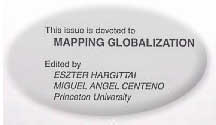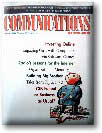|
|
|
|
|
|
|
|
|
|
|
| Research Interests | My broad areas of interest are the sociology of culture,
communications, social
networks, economic sociology, globalization and stratification. My
current projects
focus on the Internet, more
specifically, the social and policy implications of
information
technologies. I am also interested in the use of social network methods in
the empirical study
of globalization, with
particular emphasis on integrating developments in international
communications into a broader vision of globalization.
|
| Dissertation | In my dissertation, I looked at inequalities in people's
ability to efficiently use the Web.
Dissertation Committee: Paul DiMaggio (Chair), Paul Starr, Miguel Centeno, Craig Calhoun (SSRC/NYU), W. Russell Neuman (White House/U.Michigan), Ron Rice (Rutgers) I defended on June 19, 2003. I am now working on articles and a book manuscript from this material. I have already written up some of it in book chapter and article format. See papers below. |
Publications |
2004. Social Science Computer Review. 22(2):210-227. Summer.
2004. First Monday. 9(3) March.
with Paul DiMaggio, Coral Celeste and Steven Shafer 2004. In Social Inequality. Edited by Kathryn Neckerman. New York: Russell Sage Foundation, 2004. pp.355-400. (1) The digital divide. Who has access to the Internet, who does not have access, and how has this changed? (2) Is access to and use of the Internet more or less unequal than access to and use of other forms of information technology (3) Inequality among persons with access to the Internet. (4) Does access to and use of the Internet affect people's life chances (5) How might the changing technology, regulatory environment and industrial organization of the Internet render obsolete the findings reported hear?
2004. Community Practice in the Network Society: Local Actions/Global Interaction. Edited by Peter Day and Doug Schuler. New York: Routledge. pp.66-76.
2003. The New Economy Handbook. Edited by Derek C. Jones. Academic Press.
2003. IT & Society. 1(2) Winter.
2003. The Internet and American Life Edited by Philip Howard and Steve Jones. Sage Publications. >>Please send me a note at papers @ eszter.com if you would like a pre-print e-copy of this paper.<<
2002. First Monday. 7(4) http://firstmonday.org/issues/issue7_4/hargittai/
2002. Journal of the American Society for Information Science and Technology. 53(14):1239-1244.
(with Paul DiMaggio) 2001. Published as Working Paper #19, Center for Arts and Cultural Policy Studies, Woodrow Wilson School, Princeton University.
2001. (with Paul DiMaggio, Russell Neuman and John Robinson) Annual Review of Sociology. 27. 307-336. Send me a note at papers@eszter.com if you cannot get to that site and I'll send you a copy.
2001. in Symmetry 2000 Eds. István Hargittai & Torvard C. Laurent. London: Portland Press Ltd.
(with Miguel Angel Centeno) 2001. American Behavioral Scientist 44(10)
A shorter version of this paper was reprinted in the Australian Online Opinion
2000. info 2(6) (December) >>Please send me a note if you'd like an e-copy of this paper<<
2000. Poetics 27(4): 233-254.
This paper was first published as Working Paper #10, Center for Arts and Cultural Policy Studies, Princeton University. 2000. Communications of the ACM. 43:1 (January)
1999. Telecommunications Policy. 23(10/11), pp.701-718. TP special issue on
Mapping Information
Societies
This paper was previously published as Migration and
Development
Working Paper #98-07, Princeton University.
|
| |
|
Presentations/ Invited Talks |
Please see my resume for an updated list. |
| |
| Other Projects | [Be sure to check out the Publications list above for projects that have made it into print.]
|
Special Seminars I Have Attended / Courses I have Taken at Princeton |
Seminars
Courses Spring '99
Fall '98
Fall '97
|
Precepting/Teaching Experience This list is outdated. See here for updates. |
"The Social Aspects of Information Technologies," Guest Lecturer, Computers In Our World (Computer Science) Princeton University (Prof. Brian Kernighan), 2000 "The Diffusion of Communication Technologies," Guest Lecturer, The Wireless Revolution: Telecommunications for the 21st Century (Electrical Engineering) Princeton University (Prof. Vincent Poor), 2000 "Personal Identity in Computer-Mediated Environments," Guest Lecturer, The Social Basis of Individual Behavior (Sociology), Princeton University (Prof. Abigail Saguy), 2000 Teaching Assistant, New Technologies in Teaching and Research, Summer Graduate Seminar, Princeton University, 1999 Preceptor for Communications, Culture, and Society (Sociology), Princeton University (Prof. Paul Starr), 1998 "Free Speech and the Internet," Guest Lecturer, The Internet (Computer Science) Smith College (Prof. Joseph O'Rourke), 1998 Teaching Assistant, Computer Literacy (Computer Science), Smith College (Prof. Joseph O'Rourke), 1993/4 Laboratory Assistant, Evaluating Information (Sociology), Smith College (Prof. Nancy Whittier), 1993/4 |
Work Cited Elsewhere Presented just for the fun of it |

Here are some of these links: In a discussion on Wired between Ralph Nader and Reed Hundt (former FCC Chair and senior advisor to Al Gore) my name came up: "According to a recent study by Princeton University sociology professor Eszter Hargittai, one of the primary causes of the spread of the Internet in any country is the competition policy of that country." (Reed Hundt) Although he got the professor part wrong, he cited the findings of my OECD Internet diffusion paper correctly. Reed Hundt makes a reference to my work again in a Senate
Judiciary statement on May 2, 2001: My paper on the methods of my Web Use Project is on a few syllabi now:
My Radio paper is on the syllabus for Donna Hoffman's class on Marketing in Computer-Mediated Environments at the Owen Graduate School of Management, Vanderbilt University This Radio paper is also on the syllabus of Mischa Schwartz's class on Telecommunications Networks and Applications at Columbia's Graduate School of Journalism. Rudy Hirschheim of the College of Business Administration at the University of Houston has a course on Information Systems with this same reading included on the syllabus in the Spring of 2000 as well as the Fall of 2001. The same Radio paper is also on the syllabus of this class: Telecommunications and Networking taught by Deborah Barreau at the School of Library and Information Science of The Catholic University of America .. as well as this class: Multimedia Writing and Literature at Centenary College of Louisiana An article in the American Scientist (the publication of Sigma Xi) mentioned my radio piece. One more for the Radio paper: Museums and the Web My piece on the Internet's diffusion in OECD countries has been cited in some exciting places. It's in a McKinsey Quarterly article. Better yet, it's also mentioned in a piece in the European edition of the Wall Street Journal (January 26, 2000 ). The Telecommunications in Europe Program at Michigan State University had a course in the summer of 2000 that had my OECD paper on the syllabus. Caslon Analytics cites my OECD paper as well as the ABS edited volume in a discussion about metrics. A report on "Creating a Development Dynamic" by accenture, the Markle Foundation and the UNDP cites my OECD work (see Note 58). A course on United States Foreign Economic Policy at the School of International Affairs of American University has the telephone network paper on its syllabus. Introduction to Technology, Literacy, and Culture - a course at the University of Texas had my Holes in the Net paper on the syllabus. Governance and Regulation of Cyberspace - My Holes in the Net paper was required reading in this course taught at The John Marshall Law School by David Loundy Analysis of literature & language II: The virtual community - a course taught by Terry Harpold at the School of Literature, Communication & Culture of Georgia Tech. Science, technology, & ideology: "Spectres of globalization" - also taught by Terry Harpold at Georgia Tech. Education: Connaissances à la Demande in Webdo (Swiss publication). They got the part about me being a prof wrong, but it's kind of funky actually. Center focuses on arts, cultural policy - about the Center for Arts and Cultural Policy Studies where I'm Research Affiliate (some of the work I am doing is mentioned here) Hargittai GS collects Website hits by immitating company page name - article in The Daily Princetonian A .COM BIZNISZ - an article in Hungarian referring to my acquisition of a hot Hungarian domain name (www.altavizsla.com) More on this domain experience. (In Hungarian) Monthly Magazine of St Faith's Church Burwood: Contact - they reference my work on comparing the Internet to radio's early years This article on "A 'Close Reading' Protocol To Identify Perception-Fashioning Rhetoric In Website Financial Reporting: The Case Of Microsoft" cites and quotes my piece in Poetics. This First Monday article on Networks, Netwars, and the Fight for the Future refers to the Mapping Globalization volume. The Annual Review of Sociology piece with Paul DiMaggio, Russ Neuman and John Robinson has been the most read Sociology piece on the Annual Review Web site each month consistently for ten months since its publication. It is starting to appear on syllabi, here are two: |
![]()
Last updated: July, 2002
web @ eszter.com
http://www.princeton.edu/~eszter/research.html


 Finding
information on the Web can be a much more complex search
process than previously experienced on many pre-Web information retrieval
systems given that finding content online does not have to happen via a
search algorithm typed into a search field. Rather, the Web allows for a
myriad of search strategies. Although there are numerous studies of Web
search techniques, these studies often limit their focus to just one part
of the search process and are not based on the behavior of the general
user population nor do they include information about the users.
This paper describes
a methodology that relies on a mix of survey instruments
and in-person observations yielding the type of rich data set that is
necessary in order to understand in depth the differences in people's
information retrieval behavior online.
Finding
information on the Web can be a much more complex search
process than previously experienced on many pre-Web information retrieval
systems given that finding content online does not have to happen via a
search algorithm typed into a search field. Rather, the Web allows for a
myriad of search strategies. Although there are numerous studies of Web
search techniques, these studies often limit their focus to just one part
of the search process and are not based on the behavior of the general
user population nor do they include information about the users.
This paper describes
a methodology that relies on a mix of survey instruments
and in-person observations yielding the type of rich data set that is
necessary in order to understand in depth the differences in people's
information retrieval behavior online.

 This paper
applies the symmetry concept to the social scientific study of the Internet with particular focus on the medium's global spread. In extending the symmetry concept to the social sciences, the paper mostly concentrates on the importance of replication, repetition and asymmetry.
This paper
applies the symmetry concept to the social scientific study of the Internet with particular focus on the medium's global spread. In extending the symmetry concept to the social sciences, the paper mostly concentrates on the importance of replication, repetition and asymmetry.


 This
paper explores what the domination of commercial
interests online
means for the visibility of non-profit content on the Web. In addition to
discussing how simply being on the Web does not automatically lead to
user visits, the paper makes specific recommendations to site owners on
ways of achieving greater popularity.
This
paper explores what the domination of commercial
interests online
means for the visibility of non-profit content on the Web. In addition to
discussing how simply being on the Web does not automatically lead to
user visits, the paper makes specific recommendations to site owners on
ways of achieving greater popularity.


